2014 TOYOTA AURIS HYBRID transmission
[x] Cancel search: transmissionPage 242 of 788
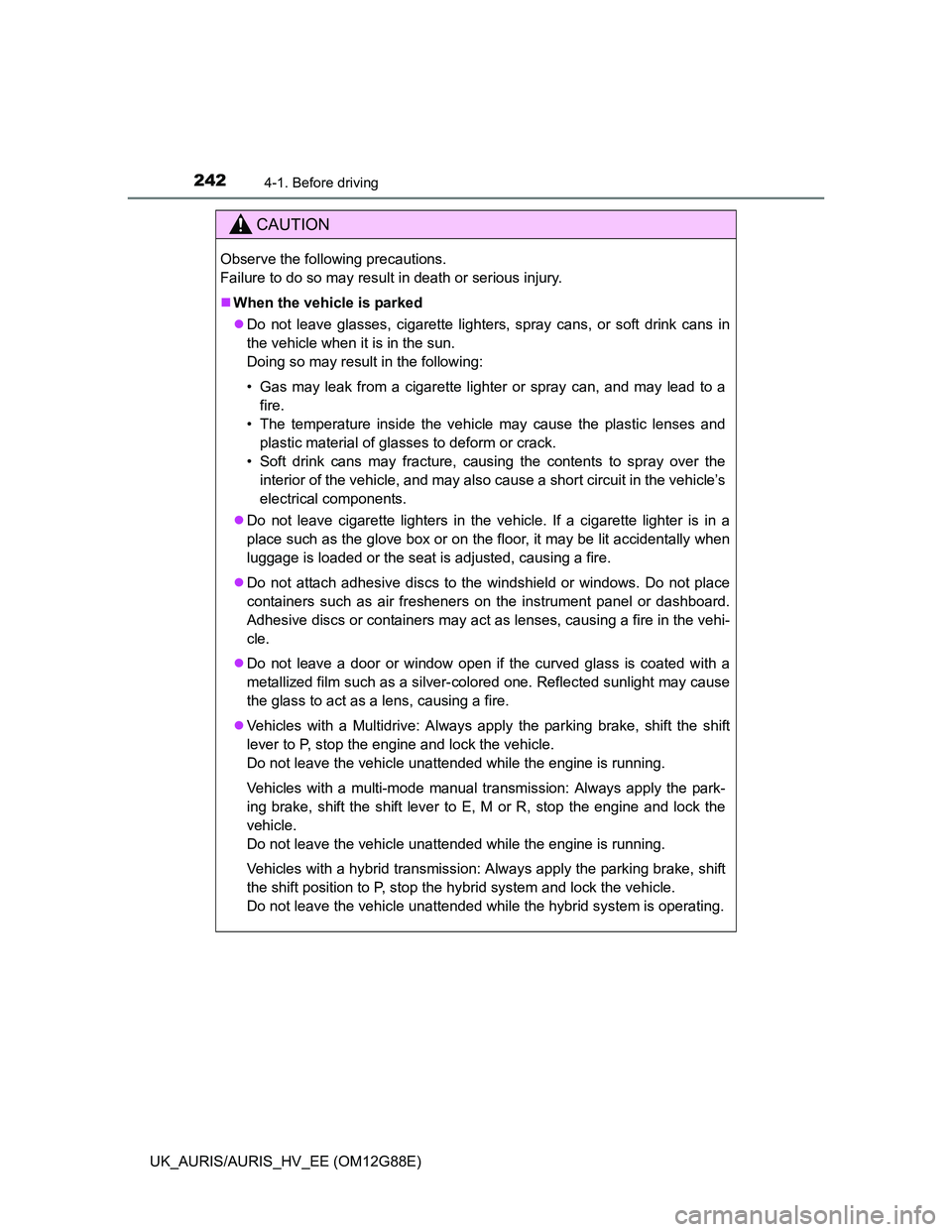
2424-1. Before driving
UK_AURIS/AURIS_HV_EE (OM12G88E)
CAUTION
Observe the following precautions.
Failure to do so may result in death or serious injury.
When the vehicle is parked
Do not leave glasses, cigarette lighters, spray cans, or soft drink cans in
the vehicle when it is in the sun.
Doing so may result in the following:
• Gas may leak from a cigarette lighter or spray can, and may lead to a
fire.
• The temperature inside the vehicle may cause the plastic lenses and
plastic material of glasses to deform or crack.
• Soft drink cans may fracture, causing the contents to spray over the
interior of the vehicle, and may also cause a short circuit in the vehicle’s
electrical components.
Do not leave cigarette lighters in the vehicle. If a cigarette lighter is in a
place such as the glove box or on the floor, it may be lit accidentally when
luggage is loaded or the seat is adjusted, causing a fire.
Do not attach adhesive discs to the windshield or windows. Do not place
containers such as air fresheners on the instrument panel or dashboard.
Adhesive discs or containers may act as lenses, causing a fire in the vehi-
cle.
Do not leave a door or window open if the curved glass is coated with a
metallized film such as a silver-colored one. Reflected sunlight may cause
the glass to act as a lens, causing a fire.
Vehicles with a Multidrive: Always apply the parking brake, shift the shift
lever to P, stop the engine and lock the vehicle.
Do not leave the vehicle unattended while the engine is running.
Vehicles with a multi-mode manual transmission: Always apply the park-
ing brake, shift the shift lever to E, M or R, stop the engine and lock the
vehicle.
Do not leave the vehicle unattended while the engine is running.
Vehicles with a hybrid transmission: Always apply the parking brake, shift
the shift position to P, stop the hybrid system and lock the vehicle.
Do not leave the vehicle unattended while the hybrid system is operating.
Page 243 of 788
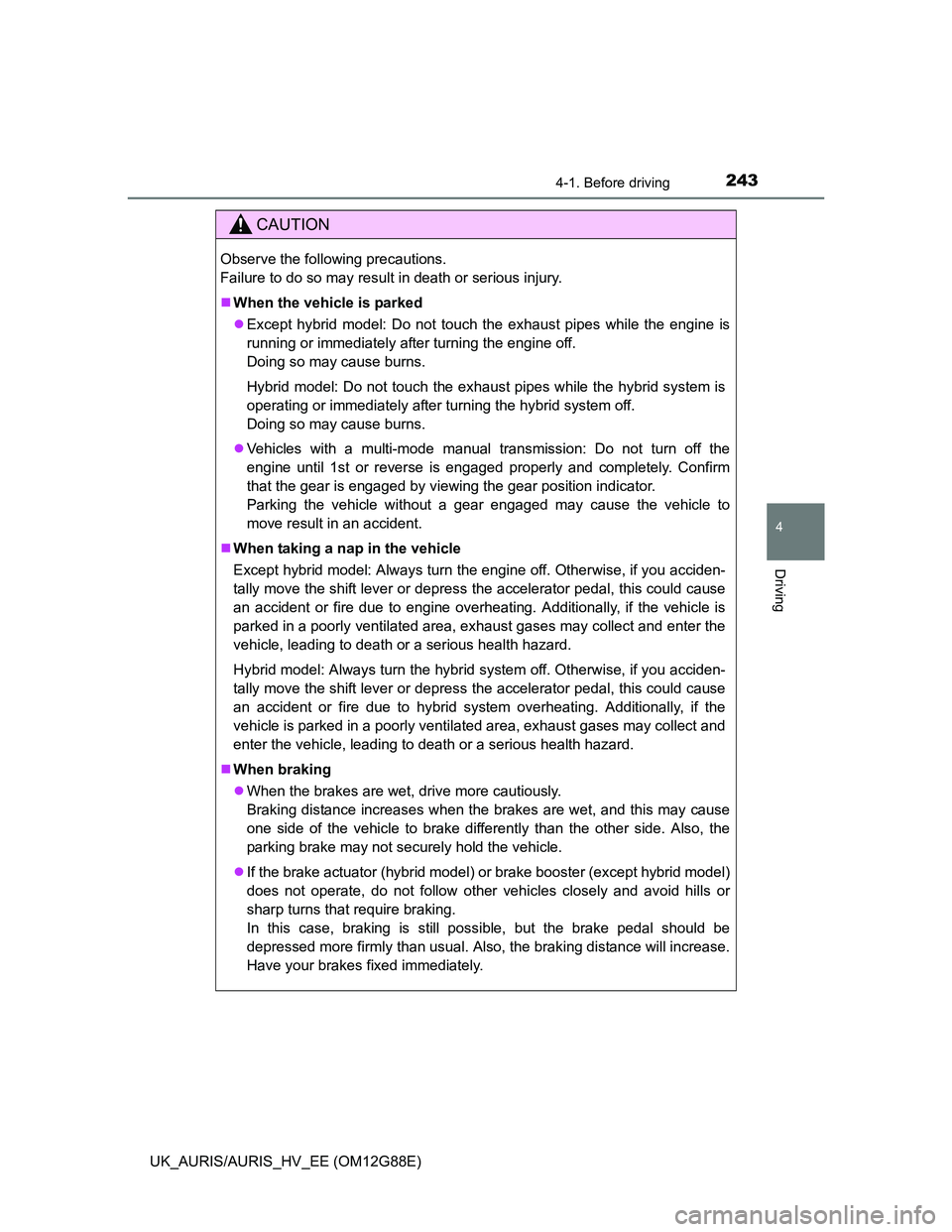
2434-1. Before driving
UK_AURIS/AURIS_HV_EE (OM12G88E)
4
Driving
CAUTION
Observe the following precautions.
Failure to do so may result in death or serious injury.
When the vehicle is parked
Except hybrid model: Do not touch the exhaust pipes while the engine is
running or immediately after turning the engine off.
Doing so may cause burns.
Hybrid model: Do not touch the exhaust pipes while the hybrid system is
operating or immediately after turning the hybrid system off.
Doing so may cause burns.
Vehicles with a multi-mode manual transmission: Do not turn off the
engine until 1st or reverse is engaged properly and completely. Confirm
that the gear is engaged by viewing the gear position indicator.
Parking the vehicle without a gear engaged may cause the vehicle to
move result in an accident.
When taking a nap in the vehicle
Except hybrid model: Always turn the engine off. Otherwise, if you acciden-
tally move the shift lever or depress the accelerator pedal, this could cause
an accident or fire due to engine overheating. Additionally, if the vehicle is
parked in a poorly ventilated area, exhaust gases may collect and enter the
vehicle, leading to death or a serious health hazard.
Hybrid model: Always turn the hybrid system off. Otherwise, if you acciden-
tally move the shift lever or depress the accelerator pedal, this could cause
an accident or fire due to hybrid system overheating. Additionally, if the
vehicle is parked in a poorly ventilated area, exhaust gases may collect and
enter the vehicle, leading to death or a serious health hazard.
When braking
When the brakes are wet, drive more cautiously.
Braking distance increases when the brakes are wet, and this may cause
one side of the vehicle to brake differently than the other side. Also, the
parking brake may not securely hold the vehicle.
If the brake actuator (hybrid model) or brake booster (except hybrid model)
does not operate, do not follow other vehicles closely and avoid hills or
sharp turns that require braking.
In this case, braking is still possible, but the brake pedal should be
depressed more firmly than usual. Also, the braking distance will increase.
Have your brakes fixed immediately.
Page 244 of 788
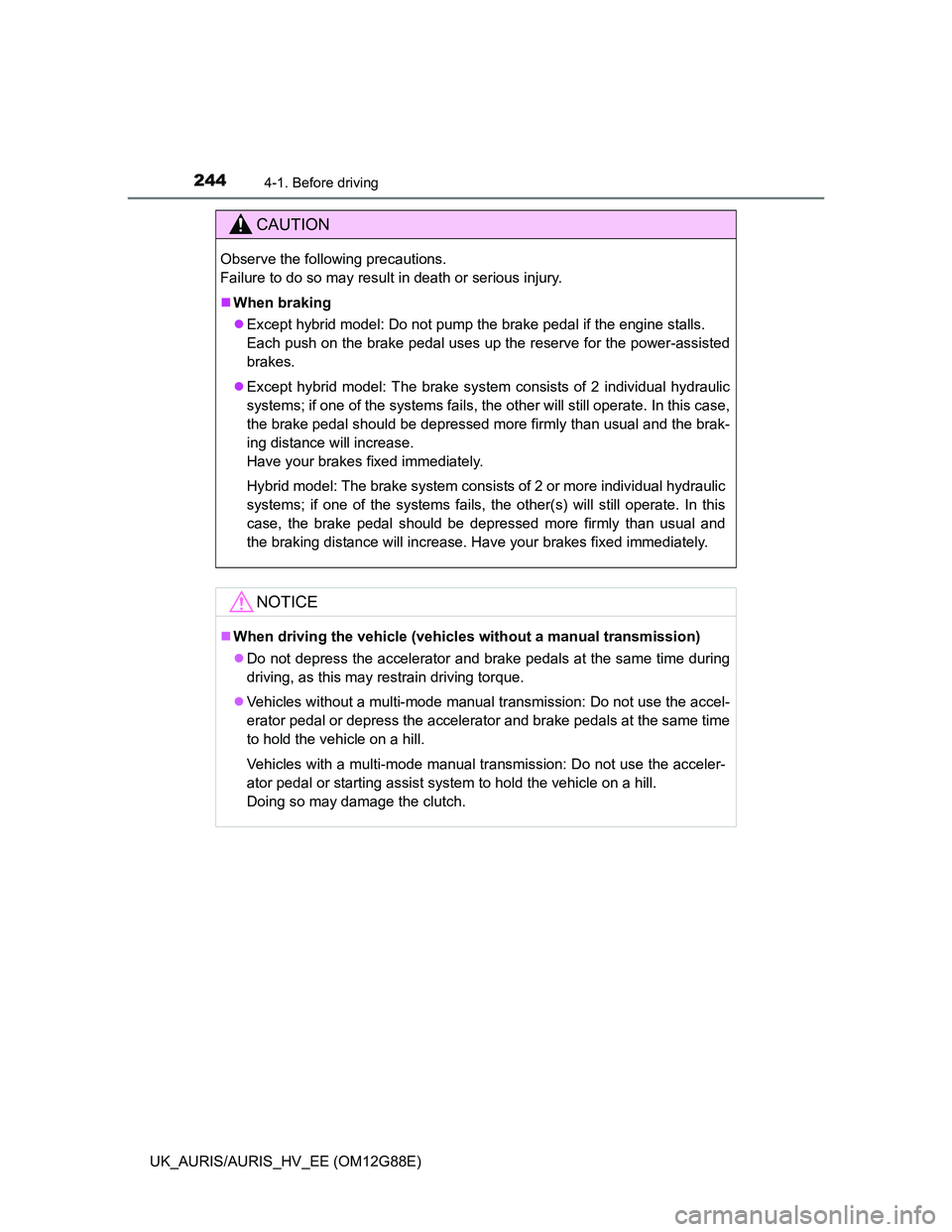
2444-1. Before driving
UK_AURIS/AURIS_HV_EE (OM12G88E)
CAUTION
Observe the following precautions.
Failure to do so may result in death or serious injury.
When braking
Except hybrid model: Do not pump the brake pedal if the engine stalls.
Each push on the brake pedal uses up the reserve for the power-assisted
brakes.
Except hybrid model: The brake system consists of 2 individual hydraulic
systems; if one of the systems fails, the other will still operate. In this case,
the brake pedal should be depressed more firmly than usual and the brak-
ing distance will increase.
Have your brakes fixed immediately.
Hybrid model: The brake system consists of 2 or more individual hydraulic
systems; if one of the systems fails, the other(s) will still operate. In this
case, the brake pedal should be depressed more firmly than usual and
the braking distance will increase. Have your brakes fixed immediately.
NOTICE
When driving the vehicle (vehicles without a manual transmission)
Do not depress the accelerator and brake pedals at the same time during
driving, as this may restrain driving torque.
Vehicles without a multi-mode manual transmission: Do not use the accel-
erator pedal or depress the accelerator and brake pedals at the same time
to hold the vehicle on a hill.
Vehicles with a multi-mode manual transmission: Do not use the acceler-
ator pedal or starting assist system to hold the vehicle on a hill.
Doing so may damage the clutch.
Page 245 of 788
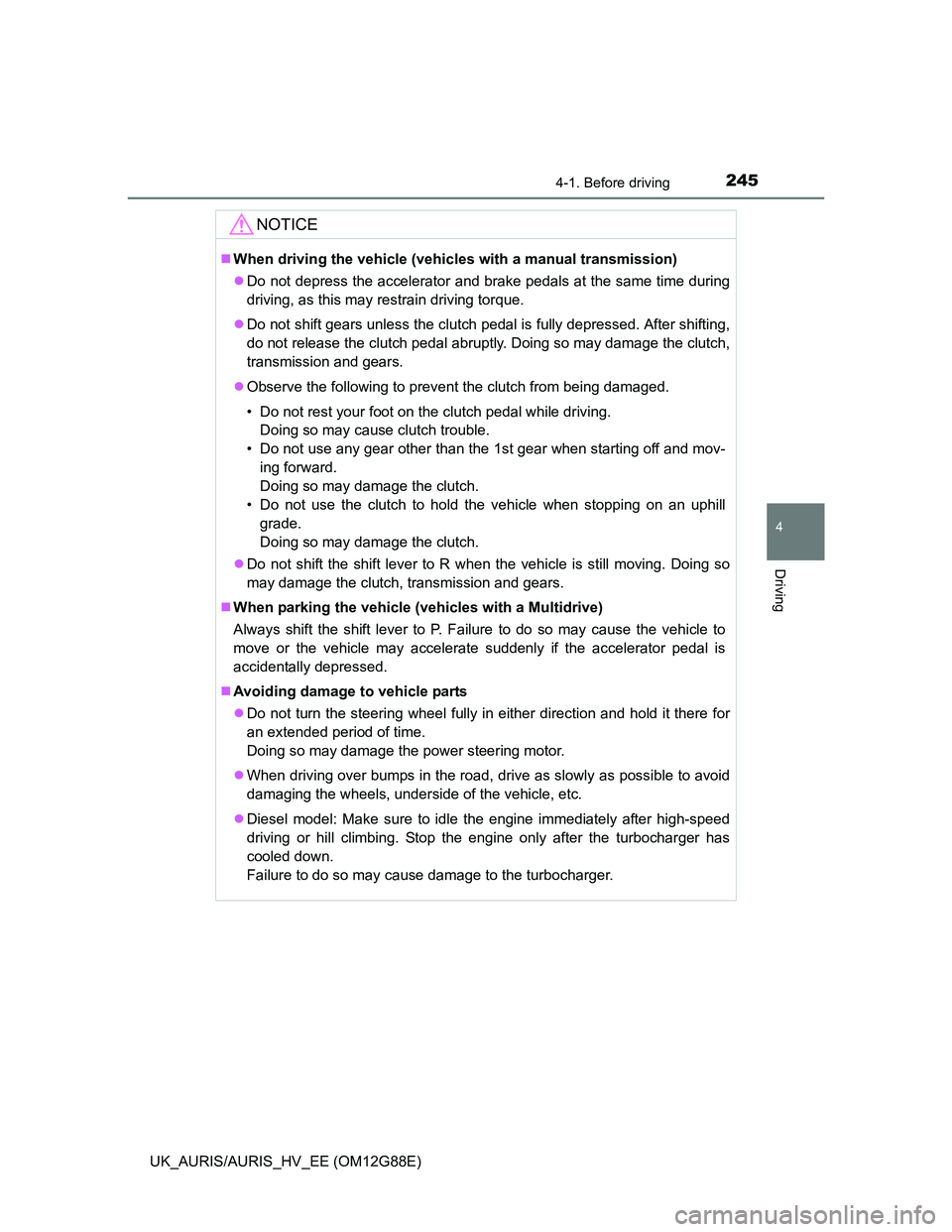
2454-1. Before driving
UK_AURIS/AURIS_HV_EE (OM12G88E)
4
Driving
NOTICE
When driving the vehicle (vehicles with a manual transmission)
Do not depress the accelerator and brake pedals at the same time during
driving, as this may restrain driving torque.
Do not shift gears unless the clutch pedal is fully depressed. After shifting,
do not release the clutch pedal abruptly. Doing so may damage the clutch,
transmission and gears.
Observe the following to prevent the clutch from being damaged.
• Do not rest your foot on the clutch pedal while driving.
Doing so may cause clutch trouble.
• Do not use any gear other than the 1st gear when starting off and mov-
ing forward.
Doing so may damage the clutch.
• Do not use the clutch to hold the vehicle when stopping on an uphill
grade.
Doing so may damage the clutch.
Do not shift the shift lever to R when the vehicle is still moving. Doing so
may damage the clutch, transmission and gears.
When parking the vehicle (vehicles with a Multidrive)
Always shift the shift lever to P. Failure to do so may cause the vehicle to
move or the vehicle may accelerate suddenly if the accelerator pedal is
accidentally depressed.
Avoiding damage to vehicle parts
Do not turn the steering wheel fully in either direction and hold it there for
an extended period of time.
Doing so may damage the power steering motor.
When driving over bumps in the road, drive as slowly as possible to avoid
damaging the wheels, underside of the vehicle, etc.
Diesel model: Make sure to idle the engine immediately after high-speed
driving or hill climbing. Stop the engine only after the turbocharger has
cooled down.
Failure to do so may cause damage to the turbocharger.
Page 256 of 788

2564-1. Before driving
UK_AURIS/AURIS_HV_EE (OM12G88E)
Important points regarding stability
Vehicle movement resulting from uneven road surfaces and strong
crosswinds will affect handling. The vehicle may also be rocked by
passing buses or large trucks. Frequently check behind when mov-
ing alongside such vehicles. As soon as such vehicle movement
occurs, immediately start to decelerate smoothly by slowly applying
the brakes. Always steer the vehicle straight ahead while braking.
Passing other vehicles
Consider the total combined length of your vehicle and trailer and
ensure that the vehicle-to-vehicle distance is sufficient before exe-
cuting lane changes.
Transmission information
Multidrive:
To maintain engine braking efficiency and charging system perfor-
mance when using engine braking, do not use the transmission in
D, must be in M and select gear step 4 or lower. (P. 293)
Multi-mode manual transmission:
Select an appropriate gear in M position to maintain the effective-
ness of engine braking and to maintain charging system perfor-
mance.
Manual transmission:
Refrain from driving in 6th gear to maintain the effectiveness of
engine braking and to maintain charging system performance.
If the engine overheats
Towing a loaded trailer up a long, steep incline in temperatures
exceeding 30C (85F) may result in the engine overheating. If the
engine coolant temperature gauge indicates that the engine is over-
heating, turn the air conditioning off immediately, leave the road and
stop the vehicle in a safe place. (P. 720)
Page 257 of 788
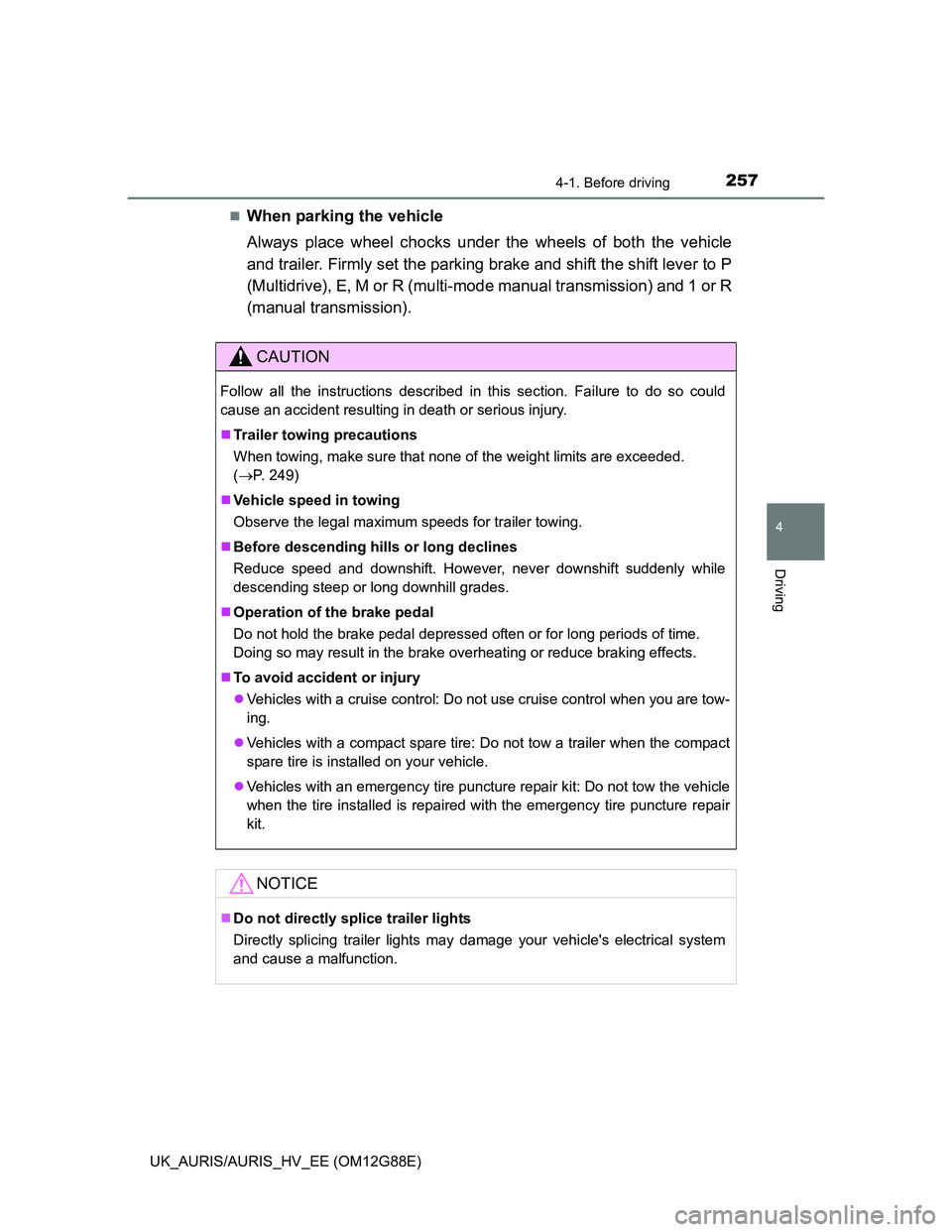
2574-1. Before driving
UK_AURIS/AURIS_HV_EE (OM12G88E)
4
Driving
When parking the vehicle
Always place wheel chocks under the wheels of both the vehicle
and trailer. Firmly set the parking brake and shift the shift lever to P
(Multidrive), E, M or R (multi-mode manual transmission) and 1 or R
(manual transmission).
CAUTION
Follow all the instructions described in this section. Failure to do so could
cause an accident resulting in death or serious injury.
Trailer towing precautions
When towing, make sure that none of the weight limits are exceeded.
(P. 249)
Vehicle speed in towing
Observe the legal maximum speeds for trailer towing.
Before descending hills or long declines
Reduce speed and downshift. However, never downshift suddenly while
descending steep or long downhill grades.
Operation of the brake pedal
Do not hold the brake pedal depressed often or for long periods of time.
Doing so may result in the brake overheating or reduce braking effects.
To avoid accident or injury
Vehicles with a cruise control: Do not use cruise control when you are tow-
ing.
Vehicles with a compact spare tire: Do not tow a trailer when the compact
spare tire is installed on your vehicle.
Vehicles with an emergency tire puncture repair kit: Do not tow the vehicle
when the tire installed is repaired with the emergency tire puncture repair
kit.
NOTICE
Do not directly splice trailer lights
Directly splicing trailer lights may damage your vehicle's electrical system
and cause a malfunction.
Page 266 of 788

2664-1. Before driving
UK_AURIS/AURIS_HV_EE (OM12G88E)
Sudden acceleration/steering input/cornering
Executing sharp turns when towing may result in the trailer colliding
with your vehicle. Decelerate well in advance when approaching
turns and take them slowly and carefully to avoid sudden braking.
Important points regarding turning
The wheels of the trailer will travel closer to the inside of the curve
than the wheels of the vehicle. To make allowance for this, take the
turns wider than you would normally do.
Important points regarding stability
Vehicle movement resulting from uneven road surfaces and strong
crosswinds will affect handling. The vehicle may also be rocked by
passing buses or large trucks. Frequently check behind when mov-
ing alongside such vehicles. As soon as such vehicle movement
occurs, immediately start to decelerate smoothly by slowly applying
the brakes. Always steer the vehicle straight ahead while braking.
Passing other vehicles
Consider the total combined length of your vehicle and trailer and
ensure that the vehicle-to-vehicle distance is sufficient before exe-
cuting lane changes.
Transmission information
To maintain engine braking efficiency and charging system perfor-
mance when using engine braking, do not use the transmission in
D. Shift the shift position to B.
If the engine overheats
Towing a loaded trailer up a long, steep incline in temperatures
exceeding 30C (85F) may result in the engine overheating. If the
engine coolant temperature gauge indicates that the engine is over-
heating, turn the air conditioning off immediately, leave the road and
stop the vehicle in a safe place. (P. 700)
When parking the vehicle
Always place wheel chocks under the wheels of both the vehicle
and trailer. Firmly set the parking brake and shift the shift position to
P.
Page 268 of 788

268
UK_AURIS/AURIS_HV_EE (OM12G88E)
4-2. Driving procedures
Multidrive
Check that the parking brake is set.
Check that the shift lever is set in P.
Sit in the driver’s seat and firmly depress the brake pedal.
Turn the engine switch to the “START” position and start the
engine.
Multi-mode manual transmission
Check that the parking brake is set.
Firmly depress the brake pedal, turn the engine switch to the “ON”
position and shift the shift lever to N.
After goes out, turn the engine switch to the “START” position
and start the engine.
Manual transmission (gasoline engine)
Check that the parking brake is set.
Check that the shift lever is set in N.
Firmly depress the clutch pedal.
Turn the engine switch to the “START” position and start the
engine.
Manual transmission (diesel engine)
Check that the parking brake is set.
Check that the shift lever is set in N.
Firmly depress the clutch pedal.
Turn the engine switch to the “ON” position.
turns on.
After goes out, turn the engine switch to the “START” position
and start the engine.
Engine (ignition) switch (except hybrid model
[vehicles without a smar t entr y & start system])
Starting the engine
1
2
3
4
1
2
3
1
2
3
4
1
2
3
4
5